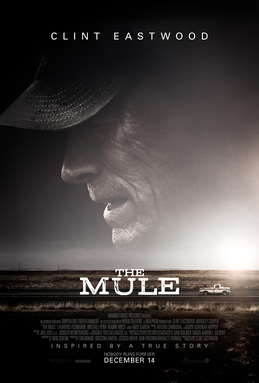In The Mule, Clint Eastwood plays Earl Stone.
In some ways, Earl is typical of the characters that Eastwood has played during the latter part of his career. He’s grouchy. He’s alienated almost everyone who was previously close to him. He drives an old pickup truck and he has no idea how to text and he seems to literally snarls whenever he sees anyone under the age of 60. He served in the Korean War and he’s not scared of guns.
In other ways, Earl is not a typical Eastwood character at all. First off, he’s on the verge of financial ruin. Earl may not be the first Eastwood character to not know how to responsibly handle money but he is perhaps the first one to be on the verge of homelessness as a result. (He’s perhaps the first of Eastwood’s modern character to face real-world consequences for his flaws.) Secondly, Earl often seems to be lost in the 21st century world. In Gran Torino and Trouble With The Curve, Eastwood played grumpy old men who could still hold their own when it came to dealing with younger people. But, in The Mule, Earl seems to be defeated by life. The only thing that he really has going for him is his reputation as a horticulturist and, as the film makes clear, that’s not a skill that’s going to bring in much money.
That all changes when Earl has a chance meeting with Rico (Victor Rasuk), a friend of his granddaughter’s. Knowing that Earl is desperate for money, Rico tells him that he could make a quick payday by transporting a package for some friends. After giving it some thought, Earl agrees. When Earl meets Rico’s friends, everyone is shocked at how old he is. They’re even more shocked when Earl says that he doesn’t know how to text. Earl is given a phone and told to answer it whenever it rings but to never use it to call anyone. A package is put in the back of Earl’s pickup truck. It’s suggested that Earl not look in the package.
Does Earl know that he’s transporting drugs? At first, it’s hard to say. While it seems obvious to us, Earl is from a different time. Still, once Earl does eventually learn that he’s being used as a drug mule, it doesn’t seem to bother him. If nothing else, Earl actually seems to get a kick out of being a real-life outlaw. He continues to make his runs and he continues to make money and, perhaps most importantly, he now has a purpose in life. In a strange way, the drug runners even become his new family. (They call him Tata, which is Spanish for grandfather.) Of course, they’re a family that makes it cleat that they’ll kill Earl if he’s ever late delivering the package but that doesn’t seem to matter to Earl.
Meanwhile, the DEA (represented by Laurence Fishburne, Bradley Cooper, and — somewhat inevitably — Michael Pena) are hearing reports about a new drug mule who has been nicknamed Tata. What they don’t suspect, of course, is that Tata is a 90 year-old man who has no criminal record and who is always very careful to obey all the traffic laws. Even when Earl is pulled over by the police, he’s such a nice old man that they let him go without bothering to really search his vehicle. It seems like Earl’s got a perfect thing going but, unfortunately, things are never as good as they seem and eventually, the reality of Earl’s situation intrudes on his fantasy….
It’s been said that The Mule is going to be Eastwood’s final film as an actor and he gives an excellent performance as Earl. The Mule, which feels, in many ways, like a good-natured companion piece to Gran Torino, features Eastwood at both his most vulnerable and, probably not coincidentally, his most likable and sympathetic. In this film, Eastwood makes clear that he’s no longer the righteous Dirty Harry or the mythological Man With No Name. Now, he’s just a man nearing the end of his life and trying to come to terms with the mistakes and the decisions of the past. Eastwood plays Earl like a man who knows that his time is limited. Smuggling drugs gives him a chance to feel like he’s alive again but, throughout it all, there’s still a deep sadness. Earl can use his money to pay his bills and to fix up the local VFW hall but he still can’t buy his family’s forgiveness. Watching the film, it’s impossible not to feel for Earl. You’re happy that he found at least a little satisfaction with his criminal career, even though you immediately suspect that things probably aren’t going to turn out well for him.
Admittedly, there is one cringe-worthy scene in which it’s suggested that the 90 year-old Earl has had a threesome with two twenty year-olds (and one gets the feeling that the scene would not have been included if not for the fact that the film’s star was also the director). For the most part, though, this is a thoughtful film that features a poignant performance from Eastwood and which is directed in a restrained, but empathetic manner. If this is Eastwood’s swan song as an actor, it’s a good note to go out on.
